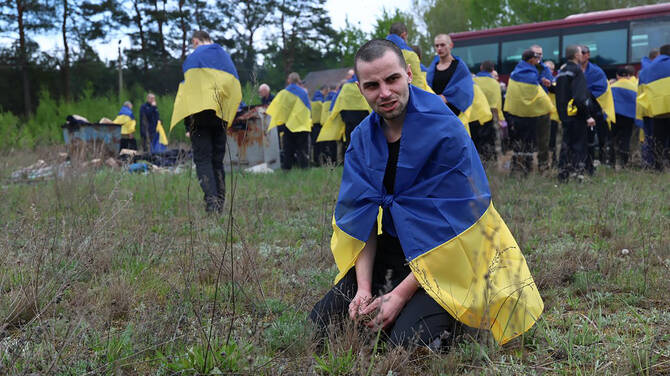RAMALLAH: Israeli police on Friday released all of the settlers arrested in connection with the burning of homes and vehicles in the occupied West Bank town of Hawara on Feb. 26.
The Ynet news website, affiliated with Yedioth Ahronoth newspaper, reported that law enforcement officials said they could not find any evidence linking the settlers to the attacks, some of which were caught on video. About 100 cars and 35 houses were destroyed, and more than 40 houses were partly burned.
Israeli sources also said that two settlers placed in administrative detention on the orders of the Defense Ministry could be released at any moment.
Hamas spokesperson Hazem Qassem said the release of settlers was evidence of the “complicity of the Israeli judiciary in covering up the crime.”
Also on Friday, Israeli troops used stun grenades and tear gas to prevent busloads of Israeli peace activists from staging a solidarity rally in Hawara, protesters said. Soldiers pressed their knees into the necks and backs of demonstrators they had pushed to the ground, according to protesters.
According to Sally Abed, from the group Standing Together, at least two people were briefly detained after the army threw them to the ground, kicked and handcuffed them. In another incident, a group of soldiers reportedly violently pushed Avraham Burg, a former speaker of the Israeli parliament speaker, until he stumbled and fell.
The Israeli army said it had declared Hawara a closed military zone and so when Israeli and Palestinian activists ignored the military order, security forces used tear gas and other tactics to disperse the crowds and maintain order.
Kayed Odeh, a 42-year-old shop owner, told Arab News that about 1,500 shops in Hawara had suffered losses amounting to hundreds of thousands of dollars as a result of the siege imposed on the town by the Israeli army since Sunday.
“Life is paralyzed in Hawara: No one goes to work, no student goes to school and the situation here has become like a battlefield in Ukraine,” he said.
“Did we expect the government to imprison a government?” he added, explaining that the settlers are like a law unto themselves. “Dozens of security cameras are installed along the main streets in Hawara to obtain evidence of the settlers’ involvement in terrorism against the townspeople.”
He said it would take at least four months for the town to return to normal following the attacks.
Palestinians and human rights activists condemned the release of the arson suspects.
Shawan Jabarin, director of human rights organization Al-Haq, told Arab News: “An accomplice cannot hold a criminal accountable. The Israeli police, army and intelligence are all part of the crime, whether through their failure to prevent it or their leniency with those involved in the Israeli terrorism carried out by settlers.”
He warned that growing right-wing Israeli extremism could lead to large-scale massacres of Palestinians.
“Those released settlers will become heroes in the eyes of the Israeli right and they may be rewarded, and we, as a human rights institution, are warning that what is to come will be worse and more dangerous,” Jabarin added.
Ibrahim Melhem, a spokesperson for the Palestinian government, told Arab News: “Have you heard of a criminal who arrested himself? The Israeli army and police are accomplices in the crime, so we are not surprised by their move.”
Referring to Israeli Finance Minister Bezalel Smotrich’s recent statement in which he called on the government to wipe out the town of Hawara, Melhem said the settlers had taken that as a green light to attack the town with impunity.
US State Department spokesperson Ned Price said Smotrich’s comments “were irresponsible. They were repugnant. They were disgusting.” He added: “And just as we condemn Palestinian incitement to violence, we condemn these provocative remarks that also amount to incitement to violence.”
A delegation led by Sven Kuhn von Burgsdorff, the EU’s representative in Palestine, visited Hawara on Friday and said his organization “will continue to demand directly the trial and accountability of those who carried out the settler attacks on the town.” Settler violence “must stop,” he added.
While the EU representatives were in Hawara, extremist Israeli parliamentarian Tzvi Sukkot arrived in the town and tried to disrupt their conversations using a loudspeaker.
Burgsdorff said: “We made extensive contacts to stop what is happening on the ground, and unfortunately, this intervention was late.” He added that his team will continue its efforts to prevent such attacks against the Palestinian people.
He also demanded compensation for the arson victims, and said his delegation’s visit “constitutes a message of solidarity from the international community with the people of Hawara and neighboring villages.”
Hagai Elad, director general of Israeli human rights organization B’Tselem, said the Israeli government was sponsoring the attacks by settlers by providing them with immunity from any repercussions in the occupied Palestinian territories.
Muin Dumaidi, Hawara’s mayor, said the attacks have dealt a psychological blow to residents. He also expressed hope that protection might be provided for Hawara and neighboring villages.
Meanwhile, residents of the town have installed early-warning systems and provided whistles to alert the population in case of any further attacks by settlers. This is similar to the system used by Israelis to warn people of Hamas rocket attacks from Gaza.
Early-warning sirens were used for the first time in Hawara on Thursday evening as dozens of settlers approached the town to attack houses on its outskirts. Odeh, the local shop owner, said alarms have been fitted to loudspeakers at six mosques.































